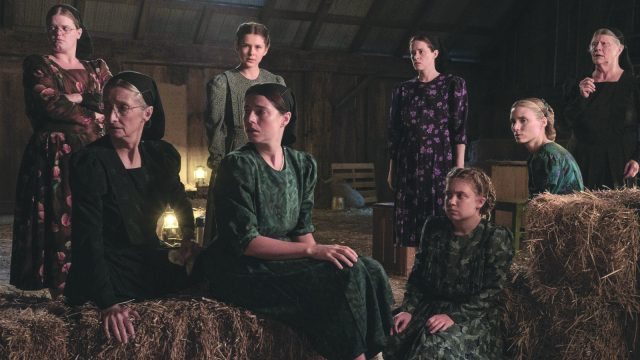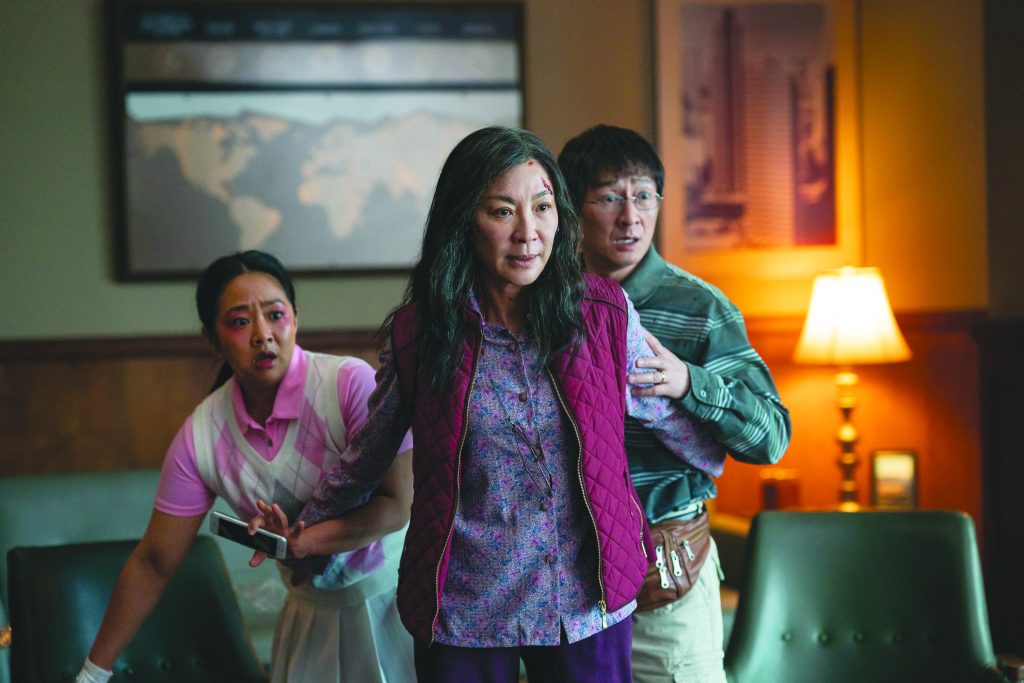
Lydia Tár is broken. Pulled from the podium, kicked out of her Berlin apartment, barred from seeing her daughter, the disgraced conductor returns to her family house on Long Island, pokes around her childhood room — perfectly preserved as if she were eternally 12 — and pulls a long adored VHS from the closet. The program: Leonard Bernstein’s Young People’s Concert.
Lydia slides the VHS into the player and watches her former mentor lead the New York Philharmonic through a stirring rendition of Tchaikovsky’s fifth symphony. She watches as the music fills the dusty room, minor notes become major and long dormant emotions flood her face as Bernstein turns to the audience and asks, “Didn’t you feel triumphant?”
What an odd question to hurl at Lydia at this particular moment, but Tár’s writer/producer/director Todd Field is up to something. So are all the other filmmakers on this list of my favorite films of 2022. Even the narratives with straightforward surfaces disguise complex interiors, the kind that reward investigation by asking uncomfortable questions.
No movie in ’22 felt as emblematic of the moment we’re passing through as Tár. Would we feel the same way about the main character’s behavior were she not female and queer? Would she be easier to dismiss if the art she produced was not heartfelt, powerful and meaningful for so many people? And what of the movie’s coda, where Lydia, unmoored in Southeast Asia, might be undergoing a rehabilitation? And would Tár be easier to dismiss if not for the stellar performance from Cate Blanchett? She is to Lydia Tár what Robert de Niro is to Travis Bickle: A crack in the door, a peek through the window, a chance to understand the monsters haunting our world.

Some of these monsters are obvious. Others are superstitious, fabricated long ago to keep the people in line. That’s the monster haunting Iranian director Jafar Panahi’s door in No Bears. Panahi’s movies have always been good, even after the Iranian government banned him from making them and placed him under house arrest in 2010. But No Bears, the movie he finished before being incarcerated for protesting the arrest of another Iranian filmmaker this past July, is even better. A fine line between reality and fiction populates every one of his movies, but in No Bears, even the reenactments are taut with desperation. And when Panahi reveals his hand, it doesn’t feel like a trick, just a revelation.
Speaking of filmmakers who produced their best work in ’22, Irish writer-director Martin McDonagh turned one of his unpublished plays from decades ago into the funniest and most thoughtful exploration of human bonding of his career: The Banshees of Inisherin. Colin Farrell excels as the kind-hearted and dull Pádraic, and Brendan Gleeson is magnificent as Colm, a man who thinks he’s grown tired of his friend’s dullness but is really fed up with his own empty daily existence. Colm comes across as angry at Pádriac, but he’s just angry at himself. So much so that self-mutilation isn’t out of the question. How perfect that this is also the movie that made me laugh the most.
Humor is also part of Bones and All, though you might miss it amid the smattering of other high concepts: lovers on the run meets coming-of-age meets a road movie set in the decaying small towns of the Midwest featuring cannibals. They are Lee (Timothée Chalamet) and Maren (Taylor Russel), two beautiful and captivating young actors surrounded by an almost comical level of creepy older men (Mark Rylance, Michael Stuhlbarg and David Gordon Green). Bones and All is about Lee and Maren’s youthful beauty — much in the same way Badlands and Bonnie and Clyde were about their main characters’ youth and beauty — and it’s certainly about the unsettling men haunting the margins, but the movie is simultaneously about a dozen things, resisting each in lieu of the other. The romance is obvious, and the difficulty of traversing family is evident. There are a dozen metaphorical roads to explore. It’s a vegan story, according to Camille DeAngelis, the author of the source material. Makes sense when you think about it.
Aftersun, the debut feature from Scottish writer-director Charlotte Wells is also a coming-of-age story, but in two parts. The first revolves around Sophie (Frankie Corio), an 11-year-old on holiday in Turkey with her 31-year-old father, Calum (Paul Mescal). This is the summer Sophie had her first kiss, spent time around kids much older than her and started to see the world as is. Then the narrative jumps to 31-year-old Sophie (Celia Rowlson-Hall), now a parent of a young child, reflecting on that summer she spent with her father 20 years ago. Through memories and images she recorded on a DVCAM, Sophie searches the home movie for clues of what lurks below the sunny surface. It’s beautiful and heartbreaking and uplifting and sad — everything you want from a quiet story about a father and a daughter and that one summer vacation way back when.
Speaking of everything: No movie had it all quite like the Tollywood mega-smash RRR (Rise Roar Revolt) from Indian director S.S. Rajamouli. Set in 1920s India, still under British rule, RRR is a war epic, a historical fiction, a musical and one of the best buddy flicks in recent memory. The dance numbers are sensational, the fights are a thrilling combination of wire-work, hand-to-hand combat and explosions that look like anime come to life, the villains are cartoonish in their villainy, and the bromance — oh, the bromance! N.T. Rama Rao Jr. as Bheem and Ram Charan Teja as Raju are a pair for the ages. Everything is dialed up to 11, so much so that you might want to enjoy it in two 90-minute sittings.

RRR wasn’t alone in its glorious, super-stuffed excess. It seems like a lot of movies this year embraced maximalist cinema, few of them as successful as Dan Kwan and Daniel Scheinert’s Everything Everywhere All At Once, an eye-popping blend of action, multiverse hopscotching, romantic longing, familial disappointment, tax-evasion, talking rocks, raccoon chefs and hot dogs for fingers. It’s bonkers, rambunctious and ridiculously silly. It’s also incredibly heartfelt and honest, the kind of movie that doesn’t use humor and silliness to undercut the seriousness but to underline it. Kwan and Scheinert’s movie smartly focuses on specificity and grasps something universal. Plus, it doesn’t hurt that the whole thing is anchored by three of the year’s best performances: Michelle Yeoh, Ke Huy Quan and Stephanie Hsu. It’s pretty wonderful.
Ditto for Neptune Frost, arguably the most rebellious and revolutionary title on this list of rebellious and revolutionary movies. Written by Saul Williams and directed by Williams and cinematographer Anisia Uzeyman, Neptune Frost celebrates the plurality of society and individuals with an Afrofuturistic story about a band of rebels leading a physical and electronic rebellion in a future that’s either very distant or already here. The costuming and production design alone — a weaving of old-school tech into hair, make-up and clothing — gives Neptune Frost a grounded reality while simultaneously commenting on systemic racism and class inequities. And it’s a musical! Some movies never run out of things to say.
But they need not always shout. French filmmaker Mia Hansen-Løve’s One Fine Morning is much quieter than other titles on this list. But what it has to say about single parenting, divorce, rekindled romance, navigating elder care, and so much more is as soft as the sun-dappled streets of Paris in late spring. One Fine Morning is Hansen-Løve’s eighth feature in a career that grows stronger with every entry. And her work here with lead actress Léa Seydoux is so harmonious it would be a shame if they didn’t continue to collaborate.
Which brings us conveniently to the end, the movie that feels most collaborative on this list, most egalitarian, the most Socratic: Canadian filmmaker Sarah Polley’s Women Talking. Based on Miriam Towes’ 2018 novel and featuring eight principal actresses (Rooney Mara, Judith Ivey, Michelle McLeod, Kate Hallett, Liv McNeil, Claire Foy, Sheila McCarthy and Jessie Buckley), the film centers on the decision to leave the Mennonite colony these women have called home all their life.
The men of the colony have been drugging and assaulting them in the middle of the night. Seems like a good enough reason to get the hell out of dodge, but many of the women refuse. They have their reasons. Everyone does. So while the men are away — save for one, August (Ben Wishaw) — the women gather to determine if they will leave or stay. Whichever it is, they must do it as one. The drama of the piece lies in these discussions. How much must one reconcile, accept or reject to maintain their own sense of order while accommodating for others?














